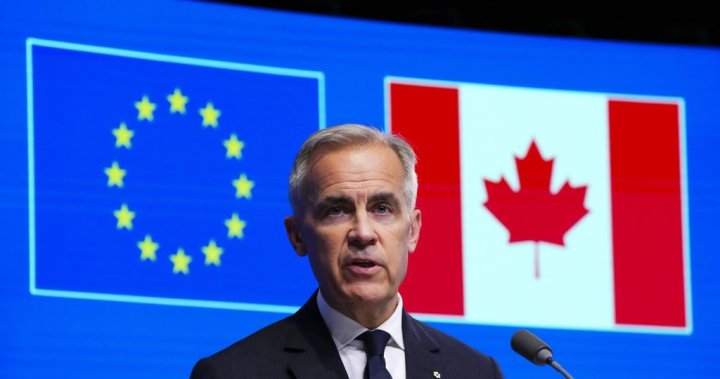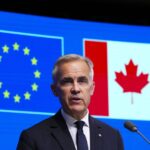Article – As NATO’s 75th anniversary summit commences in Washington this week, former Bank of England governor Mark Carney is stepping into a controversial advisory role that could reshape military spending across the alliance. The Canadian economist, once rumored as a potential Liberal Party leader, will spearhead efforts to convince reluctant allies to meet—and potentially exceed—NATO’s long-established defense spending targets.
“We’re confronting an inflection point in global security,” Carney told me during a brief exchange at last month’s economic forum in Brussels. “The alliance needs sustainable financing mechanisms that reflect today’s threat landscape, not yesterday’s budget constraints.”
His appointment signals NATO Secretary-General Jens Stoltenberg’s determination to address the alliance’s persistent funding gaps before his term ends this fall. Currently, just 18 of NATO’s 32 members meet the 2% of GDP threshold for defense spending agreed upon in 2014, according to the alliance’s latest financial report.
Carney’s involvement comes as tensions between NATO and Russia have reached their highest point since the Cold War. The Ukrainian conflict has entered its third year with no resolution in sight, while China’s growing partnership with Moscow has complicated the strategic calculus for Western powers.
Canadian Prime Minister Justin Trudeau, whose government has consistently fallen short of NATO’s spending targets, praised Carney’s appointment but stopped short of committing to immediate budget increases. “Mark brings exceptional financial expertise that will help all members meet their obligations in a fiscally responsible way,” Trudeau said in a statement released by the Prime Minister’s Office.
Critics, however, question whether Carney—whose background lies in central banking rather than defense policy—possesses the necessary credentials for the role. “This appointment feels more political than practical,” said Richard Shimooka, senior fellow at the Macdonald-Laurier Institute. “NATO needs military strategists who understand defense procurement, not another economist telling countries to spend money they claim not to have.”
The timing of Carney’s NATO role has raised eyebrows in Canadian political circles, where speculation about his political ambitions continues despite his repeated denials of interest in seeking office. His recent book “Value(s): Building a Better World for All” reads partly as a policy platform, addressing economic inequality alongside climate change—issues that resonate with potential Liberal voters.
Behind closed doors, some NATO officials express hope that Carney might bring innovative financing approaches to defense spending. One senior NATO diplomat, speaking on condition of anonymity, suggested Carney might propose “burden-sharing mechanisms similar to climate finance instruments—spreading costs according to capacity while ensuring collective security benefits.”
The summit agenda reflects growing anxiety about threats beyond Russia. For the first time, Indo-Pacific partners Japan, South Korea, Australia, and New Zealand will participate in formal discussions, underscoring NATO’s expanding geographic concerns regarding China’s military modernization and territorial assertions.
U.S. President Joe Biden, hosting what may be his final NATO summit, is expected to pressure European allies to maintain support for Ukraine despite domestic political headwinds on both sides of the Atlantic. A $61 billion American aid package approved in April temporarily eased concerns about faltering Western resolve, but questions about long-term sustainability remain.
The International Monetary Fund estimates Ukraine needs approximately $3-5 billion monthly for basic government functions alone, with military and reconstruction costs driving total requirements far higher. European Commission figures suggest EU members have collectively provided over €85 billion in assistance since Russia’s full-scale invasion, though this support remains unevenly distributed among member states.
Carney’s challenge extends beyond simply encouraging higher defense budgets. He must address the structural economic constraints facing many European NATO members still recovering from pandemic-related fiscal pressures and energy market disruptions stemming from the Ukraine conflict.
“The 2% target has always been somewhat arbitrary,” explained Alexandra Marksteiner, researcher at the Stockholm International Peace Research Institute. “What matters more is whether spending addresses actual capability gaps and interoperability needs, not hitting an abstract percentage.”
On the summit’s sidelines, debates continue about potentially raising the spending target to 2.5% or even 3% of GDP—a move championed by eastern flank countries like Poland and the Baltic states but viewed skeptically by western European members facing domestic budget pressures.
For Carney, success will depend on balancing fiscal pragmatism with strategic necessity. Having navigated the 2008 financial crisis as Bank of Canada governor and guided Britain’s financial system through Brexit as Bank of England head, he brings crisis management credentials to an alliance confronting multiple simultaneous challenges.
As delegates gather beneath Washington’s cherry blossoms, the symbolic weight of NATO’s return to its birthplace city for this anniversary summit isn’t lost on participants. The alliance faces questions about its purpose and cohesion that echo debates from its founding days, albeit in a transformed geopolitical landscape.
Whether Carney’s economic expertise can translate into effective defense policy remains uncertain. What’s clear is that NATO’s ability to deter aggression increasingly depends not just on political resolve but on financial commitment—the very challenge the Canadian economist has been tasked with addressing.






